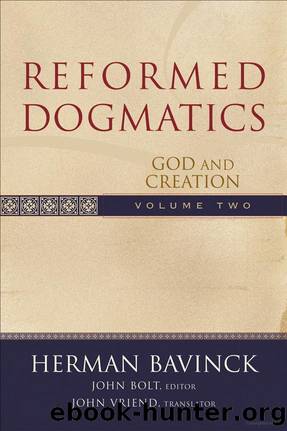Reformed Dogmatics Volume 2: God and Creation by Herman Bavinck

Author:Herman Bavinck [Bavinck, Herman]
Language: eng
Format: epub
Tags: Reference
ISBN: 9780801026553
Goodreads: 277738
Published: 2014-01-11T00:00:00+00:00
Part III
Godâs Will on Earth as It Is in Heaven
7
The Divine Counsel
Godâs works with respect to his creatures are classified into two groups: works ad intra or the decrees that are part of his counsel, and works ad extra such as creation and redemption. Godâs decrees and works do not exhaust the possibilities of his wisdom and knowledge; they are an exercise of his free and absolute will and will be realized in Godâs own time. All Godâs decrees, even election and reprobation, are made visible to us in the progress of history. They are, however, rooted in Godâs eternal foreknowledge and foreordination, which stands forever and will come to pass. Godâs purpose of election is antecedent to the facts of history; history serves to affirm that preexisting purpose. While Romans 9 most certainly speaks of Godâs action in time, the ground for the action lies outside of time, in the will and good pleasure of God alone. In all this it must be remembered that the ground of election is found exclusively in Godâs grace, love, and good pleasure.
When affirming the determining counsel of God, the major theological issue facing Christian theologians concerns human freedom. Against all deterministic thinking, the church maintained the moral free will and responsibility of human beings. It was the teaching and influence of Pelagius that led the church under Augustineâs leadership to clarify the doctrine of predestination. For the Pelagians and semi-Pelagians, human nature is not absolutely corrupted after the fall. Fallen human nature can and must cooperate with the grace of God; predestination is only a matter of foreknowledge.
By contrast, Augustine insisted that the elect âare not chosen because they believed but in order that they might believe.â Godâs absolutely sovereign will is the only ground of predestination, which includes both election and reprobation. Augustine did insist that God does not foreordain to destruction and the means that lead to itânamely, sinsâin the same sense in which he foreordains to salvation and to the means that lead to it. Reprobation is an act of divine justice, as election is an act of grace.
Pelagianism was condemned at the Council of Ephesus (431) and later at the Synod of Orange (529). The latter, however, was indecisive on the full extent of human corruption and thus opened the door to semi-Pelagianism. As it was influenced by nominalism and hardened its stance at the Council of Trent, the Roman Catholic church increasingly distanced itself from Paul and Augustine. Through a number of new distinctions, the absolutely gratuitous predestinating activity of God is reduced to, and made dependent upon, a form of foreknowledge. This trend reaches its climax in the thought of Molina, who believed that God, by a mediate knowledge, saw in advance that some humans would make good use of preparatory grace and for that reason decided to bestow it. Reprobation is then only a decree of God to punish eternally those whose sin and unbelief he has foreseen.
The Reformation returned to Augustine and Paul. Still,
Download
This site does not store any files on its server. We only index and link to content provided by other sites. Please contact the content providers to delete copyright contents if any and email us, we'll remove relevant links or contents immediately.
The Secret Power of Speaking God's Word by Joyce Meyer(3184)
Signature in the Cell: DNA and the Evidence for Intelligent Design by Stephen C. Meyer(3132)
Real Sex by Lauren F. Winner(3016)
The Holy Spirit by Billy Graham(2944)
The Gnostic Gospels by Pagels Elaine(2527)
Jesus by Paul Johnson(2352)
Devil, The by Almond Philip C(2326)
23:27 by H. L. Roberts(2248)
The Nativity by Geza Vermes(2227)
Chosen by God by R. C. Sproul(2161)
All Things New by John Eldredge(2160)
Angels of God: The Bible, the Church and the Heavenly Hosts by Mike Aquilina(1964)
The Return of the Gods by Erich von Daniken(1943)
Angels by Billy Graham(1922)
Knowing God by J.I. Packer(1855)
Jesus of Nazareth by Joseph Ratzinger(1811)
The Gnostic Gospel of St. Thomas by Tau Malachi(1794)
Evidence of the Afterlife by Jeffrey Long(1786)
How To Be Born Again by Billy Graham(1778)
